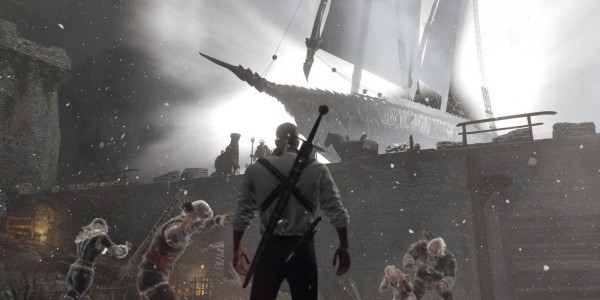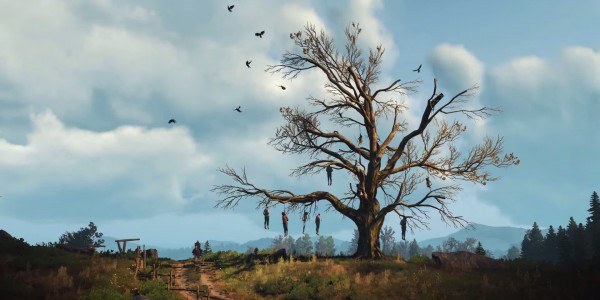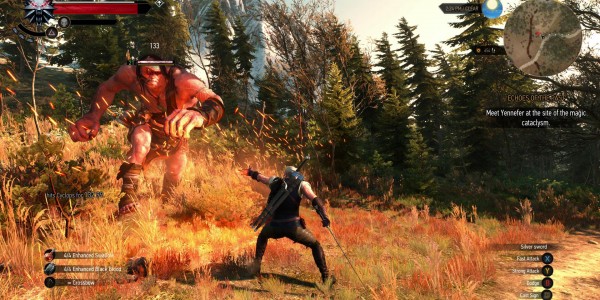The Witcher 3: Wild Hunt Review
"One of the most complete RPGs yet released, a game who's ambitions match up to the impressive technology that powers them"
With every new big-budget, large-scale RPG that is released we get a raising of the bar in terms of how much just general 'stuff' a developer can pack in. It's a veritable arms race to create the the most impressive and substantial world we've yet witnessed in a video game, and it's one that's ramped up as of late.
Skyrim?
Dragon Age? Monsieur, with these Ferrero Rocher you are really spoiling us!
The Witcher 3: Wild Hunt continues this trend, providing us with a land as jaw-dropping as any that has come before. Yet, the sheer content isn't why it sticks so resolutely in the mind, coaxing you to play it obsessively. It's the
staggering amount of care that developers CD Project Red have poured into just about all of it.
 The Witcher 3'
The Witcher 3's main storyline sees returning protagonist Geralt searching for his surrogate daughter Ciri, who is in turn being chased down herself by the 'Wild Hunt', an ominous group of otherworldly warriors tearing a vicious path through the land leaving desolation (and lots of ice) in their wake. Along the way he teams up with various figures from his past, most notably his longtime on and off lover Yennifer who also shares a maternal bond with Ciri (who you'll occasionally control in flashback sequences). Whereas in previous games much has been made of Geralt's amnesia as a way of introducing characters to the player anew, this entry places much less importance on it. Familiar faces make up much of the cast without an eyelid ever being batted.
It's these characters, as well as the minor players in the story, that make the game feel so expressive and alive. The world of
The Witcher 3 is a recognizable enough fantasy land, yet it's tone is much closer to that of the debauched, raucous and dark
Game of Thrones than it is the rather uptight creations of your man Tolkien. Your 'allies' in this world are figures like the alcoholic, family-beating Baron of Velen and the sardonic murdering prick Dijkstra. What 'good' characters there are come few and far between, and most are not without their own flaws. Chances are if someone is being nice to you then you should keep one eye on them when you turn your back.
As grim as the land is, it is far from gruesome on the eyes as
The Witcher 3's visuals are nothing short of stunning. The landmasses you'll traverse are as jaw-dropping as they are diverse, from the dense forests and luscious fields of Velen to the apocalyptically harsh stormy seas and imposing frost-covered mountains of Skellige. What truly makes them stand out though is how they breathe with a lifelike aura. These aren't just simply pretty static views to take in; the trees sway subtly in the breeze, the grass ruffles beneath your feet, the weather changes around you and smoke emanates from the chimneys of industrial Novigrad. Combine this with the caustic, mocking inhabitants that fill the various locations, singing their drunken tunes to forget the ills of the world, and you have one of the most lived-in feeling worlds in all of gaming.

Just as well then that it's a joy of a place to be in because oh my lord will you spend a lot of time exploring it. And here's where the game's main joy comes to the table: the consistently high quality of the breadth of content on offer. You know how it is, a game purports to be massive with 'hundreds of hours of gameplay' and an absurd number of quests but, really, all of it is just menial busywork that involves minimal effort and just serves to fill space.
The Witcher 3 bucks this trend. It's side quests are given the same amount of development as the main story thread. They are often multi-part journeys that take you to far parts of the world, introducing you to various colorful individuals along the way. You'll help out old friend Keira Metz investigate a haunted laboratory on an abandoned island that contains a hauntingly tragic story within itself, you'll calm civil wars between clans so they can unite and decide a new leader, and then on top of all that you've got the Witcher Contracts; various terrifying creatures you are tasked with hunting down through tracking them, preparing yourself thoroughly to face them and then toppling the often tricky combat challenge they present.
There's also plenty of random encounters to be had as you trot along through in the style of
Red Dead Redemption. The map is littered with question mark icons behind which could lie another fast travel point, some guarded treasure, a cave filled with all sorts of beasties and myriad other things. These little distractions aren't as entertaining as the quests themselves but that's why CD Projekt Red don't make them the priority. They're there to provide you with an extra something for you to check out as you make your way to and fro, a reason to venture off the beaten path. A purpose they serve excellently.
Those who were turned off by the divisive combat in
The Witcher 2 need not worry about having much of the same issue here. The core basics of this game's combat remain mostly unchanged. You're still working with deliberately animated quick and heavy melee attacks (as well as a new crossbow for dealing with flying and swimming enemies), blocking/parrying/dodging as well five magical spells or 'Signs' such as 'Quen' (a protective shield) and 'Igni' (essentially a fire spray). These Signs can now be upgraded and given secondary uses through the 'ability points' levelling system. So for instance Igni can be upgraded to be used as a more directed fire hose type thing if you hold down the right trigger instead of just pressing it once. These different uses add a real sense of progression and keep combat interesting as you level up deeper into the game.
Another source for that feeling of progression is the loot system. The game is absolutely brimming with armour, weapons as well as various runes you can attach to them in order to give them different attributes such as giving your sword a chance to set enemies on fire or giving your amour the ability to sometimes return damage. You'll also find diagrams you can take to blacksmiths for them to build if you've picked up the right materials. It's not quite a
Diablo-esque constant loot treadmill, but nonetheless you still get that quick sharp buzz when you slay a monster and pick up a properly rude looking sword.
Preparation for fights is still key, making sure that you've gathered materials to concoct various potions and other useful goodies that will help boost Geralt's various attributes, make your weapons effective against certain enemy types and so on.

However the pace of the combat has been sped up some, as well as overall made just a wee bit more forgiving. It's still hard to compare to any one other game because of it's idiosyncrasies but with the changes this time out it will probably be more palatable for those who skew towards the
Batman style of combat rather than
Dark Souls or anything like that. The joy in it comes from much the same place as conquering a tough encounter in a CRPG game. Making sure you've gotten your battle tactics just right beforehand and executing a patient, considered confrontation with the enemy. Using the multiple offensive maneuvers at your disposal smartly to target their weaknesses. Really feeling like you outwitted your opponent to come out without a scratch (or at least as few as possible).
Sometimes though on the default difficulty setting it can become a bit
too easy at points, especially if you're doing lots of side quests which most likely result in you being somewhat over-leveled for the main quests. Those looking for a stiffer challenge may want to bump that difficulty up a notch where you'll certainly find one.
Now, this
is an open-world RPG, and you know what that means: It is not without it's technical blemishes. Thankfully though, they are fairly minor both in abundance and in level of annoyance. The most issues seem to stem for your horse 'Roach', who can sometimes have trouble traversing certain terrain leading to some awkward looking moments as well as just sometimes getting stuck somewhere. Frame rate on this Xbox One version is fairly consistent with some stuttering here and there. The PC version is a more solid prospect, although you already knew that. Whichever platform you play it on you'll find a beautiful game either way.
I did come across one where game-breaking yet sort of hilarious bug: During a quest where you are instructed to stand still and get hit by an arrow in order to test some armour the AI managed to somehow miss the shot. It was not a scripted part of the quest, I was just left there, unable to move and waiting for a second shot that was never going to come. Despite being forced to reload it was worth it for the laugh all the same. This was the only encounter I had with any bug or what have you that was a more than minimal concern.
Which is remarkable because as the latest addition into the pantheon of time sink open-world RPG's
The Witcher 3 is about as complete as one could hope for. Plenty of games have tried their hand at this formula before but few, if any have backed it up with
such a vivid world and this level of mind-bogglingly deep adventuring potential. Every nook and cranny of the map contains either a quest to embark on, a little hidey-hole to discover or just some magnificent sight that forces you to put your controller down and gawp at it for a while. We hear much about the possibilities of what could be done with today's insanely powerful consoles and PCs, and here we have a game that matches up to those promises in just about every aspect. A
true epic of the format.
Pros
- Absolutely stunning world that bristles with life
- Consistent level of high quality care given to both the main story and the side quests
- A deliberate, satisfying combat system that rewards preparation and strategic thinking
- Levelling and loot systems that provide a fantastic sense of progression
- Just loads to do. Like, so very much. And most of it's great!
Cons
- The occasional moment of technical shakiness


